Business Africa
Ismail Ahmed is a migrant from Somaliland who's on a mission to give back to a country literally shunned by global powers. Somaliland has a growing number of tech hubs. Ismail Ahmed founded the now famed money transfer company, WorldRemit and this horn of African nation was its first market. Today, Somaliland’s mobile tech infrastructure is considered as one of the best on the continent. And the WorldRemit founder is poised to have a huge impact on Somalilanders.
Ismail Ahmed left his native Somaliland to further his education on a scholarship at the London Business School in the United Kingdom.
Through remittances from his brother who used to work in Saudi Arabia, he got his plane ticket to access education.
That was in 1988. Ahmed exposed corruption and was treated unfairly when he helped run a money transfer project as part of a United Nations Development Programme (UNDP) initiative in the organisation's Somalia remittance programme.
In 2010, the 59-year-old was awarded £200,000 in compensation for the aforementioned mistreatment.
Ahmed then used the funds to launch ‘’WorldRemit’’. Today, the global money transfer company allows migrants to send money to more than 130 countries. In 2020, ‘’WorldRemit’’ sent over 50 million customer payments worth nearly $10 billion.
It’s a full circle moment for the Founder and Chairman of ‘’WorldRemit’ - as this once mistreated employee turned business mogul is now giving back in a big way.
Ahmed has pledged to commit 50% of his wealth and investments in the next ten years to fund development programs in Somaliland.
He tells Business Africa that: ''I am in a fortunate position to say over the next 10 years, my ambition is to commit as much as $500 million of what I intend to make from ‘’WorldRemit’’. The focus of this would be on education, particularly literacy and health. Literacy is key to improved productivity and poverty reduction, empowerment of women and enhance political participation.’’
Record high demand for LNG
Liquefied natural gas deliveries expanded the most in a year as Asia and Europe refilled inventories drained over the winter, and as pandemic-ravaged economies slowly begin to reopen.
Imports jumped 5.8% in March from a year earlier, the biggest increase since March 2020, according to a ship-tracking data compiled by Bloomberg.
Demand for the fuel used in heating and power generation had been steadily growing before Covid-19, as nations shift away from coal-fired power over climate concerns.
Practical and relatively inexpensive, LNG has grown significantly. Nearly 45 countries now have LNG import capacity, most recently Myanmar, Ghana and Senegal.
Gas emits much less CO2 (up to 50%) than coal and fewer pollutants.
From this point of view, many experts say this is also a good substitute for heavy fuel oil in maritime transport.
Fair trade
Meet Jonathan Robinson, a former IT professional who woke up and smelled the java.
Inspired by an idea from a friend in Canada, Jonathan set out on a fair-trade coffee movement in Africa. But after Sixteen years of trading, what does fair trade mean today?
''We have worked with the same farmers in the same regions because we pay the best. That’s probably it. If another roaster comes along and offers them more money, they should and I would encourage them to take, if we can’t do it'', Robinson said.
''Bean There Coffee'' company sources from cooperatives of small scale farmers, eliminating middlemen.
From Ethiopia, Kenya, the Democratic Republic of Congo to Burundi and Tanzania, they source from only one high quality region per country and sell at a premium.
''When we have had investors before they’ve often said, Jonathan one of your problems in your business is that you pay too much for coffee. And I said obviously. That’s why we are in business... I believe in... If we are going to change things then we need to pull our necks out and say this product is worth more than we are currently paying'', he added.
''Bean There Coffee'' has already exported small amount of their coffee to the US, UK & Europe but the covid-19 pandemic has slowed things down.
''We have definitely been quiet significantly down. Probably operating about 65% of our normal situation'', he said.
Despite the Covid snag, Jonathan believes in the growth of the product. He thinks that: ''With the growth in the coffee market and the growth in the speciality coffee market, a worldwide trend to understanding that African Coffee is the best on the planet.''




![Burundi 2040: Is Corruption Undermining the Vision? [Business Africa]](https://static.euronews.com/articles/stories/08/88/17/22/320x180_cmsv2_6ed3d27f-a564-55fe-b7c8-46646c891e11-8881722.jpg)
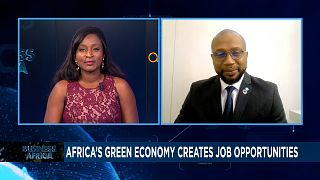
![Central African Republic: Shaping diamond's future post-embargo [Business Africa]](https://static.euronews.com/articles/stories/08/87/21/32/320x180_cmsv2_6755dab6-9ce7-5658-a0ed-88d6fec1dd61-8872132.jpg)
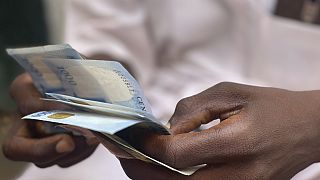

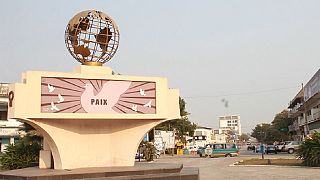
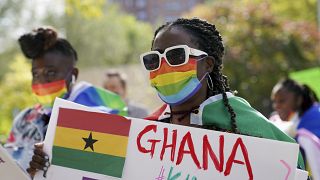
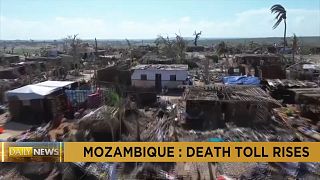

01:56
Nigeria motorists switch to gas to cut fuel costs, pollution
01:13
Ivory Coast: Rising cocoa farmgate price fails to convince
02:20
Yemeni café becomes sanctuary for migrants, intellectuals
01:23
Brazil drought hits coffee farms and threatens to push prices even higher
01:03
Egypt increases electricity rates for households by up to 50 per cent
Go to video
Production starts at Senegal's first offshore oil project